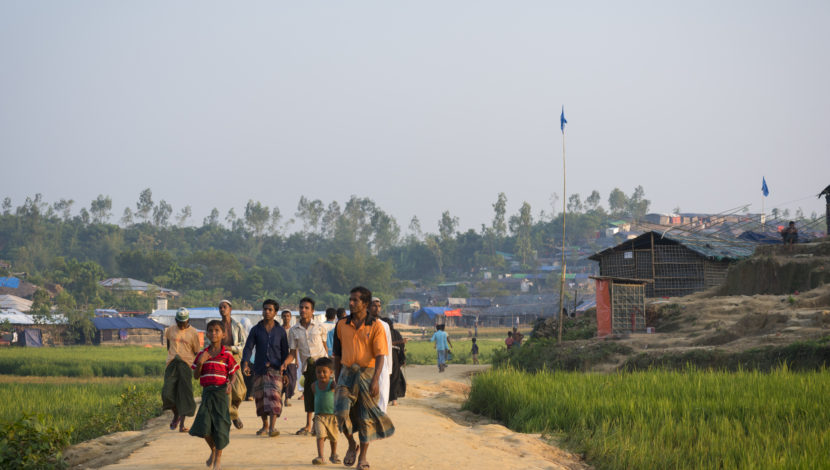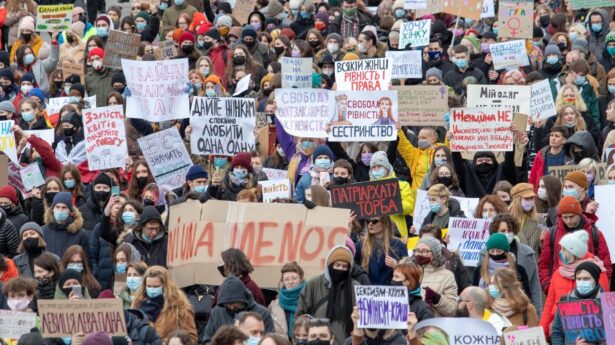The Unitarian Universalist Service Committee advances human rights through grassroots collaborations.
Genocide: Understanding a Word With Consequences (Part Two)

April 25, 2022
April is Genocide Awareness Month, a month when advocates around the world seek to educate the public about the crime of genocide and work to end it. This is the second part of a two-part blog series explaining the concept of genocide and its legal implications. Part one of the blog can be found here.
****
In part one of this blog series, we discussed President Biden’s recent choice to use the word “genocide” to describe Putin’s actions in Ukraine. While his use of this term may have been premature, given the evidence currently available, one thing is clear:
The legal status of another genocide can no longer be in dispute: the 2017 mass expulsion of the Rohingya minority from Burma (which the ruling military junta calls “Myanmar”).
Biden’s speech in Iowa, after all, was not the only time in recent weeks that a high-ranking member of his administration has used the word “genocide.” Speaking on March 21, Secretary of State Antony Blinken made a long-overdue formal acknowledgement that the crimes committed against the Rohingya constitute genocide.
Unlike Biden’s abrupt and almost casual use of the word “genocide” on April 13, Blinken’s formal determination followed months of close scrutiny and review. When it finally came, it was based on a mountain of evidence, compiled over more than five years by Rohingya survivors, international monitors, experts in humanitarian law, and human rights observers.
The crimes against the Rohingya—which culminated in the 2017 forced expulsion of nearly a million Rohingya people into Bangladesh—meet all the core elements of the definition of genocide. As Secretary Blinken laid out in detail, not only were these atrocities deliberate attempts to cause the death and suffering of thousands of Rohingya; the statements and prior actions of the military leaders who carried out the atrocities showed a clear intent to destroy the Rohingya people as a people.
Blinken’s accurate designation of these crimes as genocide was a long-awaited vindication for Rohingya leaders, who have fought for years for this overdue recognition of the truth of what was done to them.
As noted in part one of the series, however, an official genocide determination can’t just be words in a vaccuum. Genocide is a legal term, and invoking it triggers specific legal obligations.
As a party to the UN Genocide Convention, the U.S. government is duty-bound to “prevent and punish” the crime of genocide, wherever it occurs. Now that they have acknowledged that the Burmese military committed genocide, they are obliged under international law to support efforts to hold the perpetrators to account.
This may sound like a daunting task, but Rohingya leaders—including some of UUSC’s partners—have already set these efforts in motion. There are not just one, but three independent processes happening right now to seek justice for the Rohingya and accountability for the Burmese military:
- The International Criminal Court, which is investigating crimes committed by the Burmese military (although it cannot investigate the crime of genocide because its jurisdiction is limited to crimes that were partially committed in Bangladesh);
- The International Court of Justice—a UN body that is investigating charges of genocide brought by The Gambia against Myanmar as co-parties to the Genocide Convention, and which has already issued provisional measures against the Burmese government; and
- A case before the Argentinian judiciary brought by UUSC partner Tun Khin, president of the Burmese Rohingya Organization UK, under the legal doctrine of universal jurisdiction for the worst crimes.
The Biden administration could be doing more to support all three international efforts to seek justice. As Tun Khin and Daniel P. Sullivan write in a recent op-ed, the U.S. government could actively support The Gambia’s case against the military junta in the International Court of Justice by providing funding and legal support to this effort. They could also initiate further cases of their own under the theory of universal jurisdiction, similar to the one in Argentina.
The U.S. Congress should also hold the military accountable by finally passing the BURMA Act into law. This much-needed bill, authorizing further sanctions against the military junta and humanitarian aid to the people affected by their crimes, recently passed the House of Representatives. Now senators must do their part by sending it to the president’s desk.
Genocide is a serious word with serious consequences. When the U.S. government uses it, they had better be prepared to back up their words with action.
As the Burmese military continues to inflict atrocities on all the ethnic groups of the country—including recent horrific massacres and air strikes against the Karenni community, which have displaced more than 75% of the Karenni population—the risk of future genocide, and the consequences of long-term impunity for mass atrocities, could not be clearer. The perpetrators of genocide must be brought to justice.
Photo Credit— Joel Carillet

